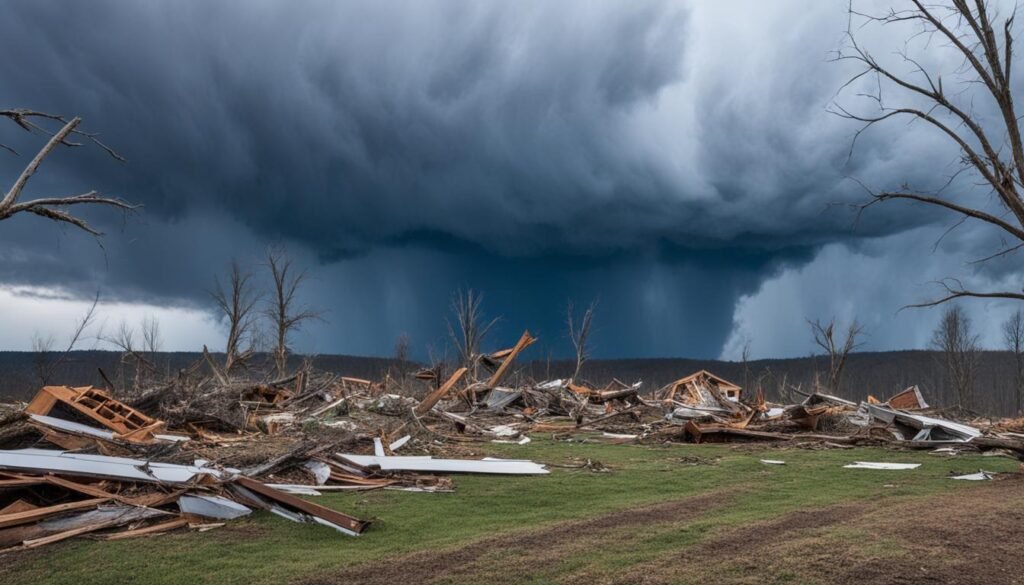Did you know that Tennessee is often referred to as the “Tornado Alley” of the South? Yes, that’s right! This beautiful state, known for its rolling hills, country music, and southern hospitality, also experiences a significant number of tornadoes each year. If you’re a resident of Tennessee or planning to visit, it’s essential to understand the tornado risk and take necessary precautions to stay safe.
Key Takeaways:
- Tennessee is commonly referred to as the “Tornado Alley” of the South.
- The state experiences a significant number of tornadoes each year.
- Understanding the tornado risk in Tennessee is crucial for residents and visitors.
- Taking necessary precautions can help mitigate the potential impact of tornadoes.
- Stay tuned for more information about tornadoes in Tennessee and how to stay safe.
Understanding Tornadoes
Tornadoes are powerful and destructive natural phenomena that can wreak havoc on the areas they strike. To fully understand tornadoes, it’s important to explore their formation and characteristics.
Formation: Tornadoes typically form within severe thunderstorms, where warm, moist air collides with cool, dry air. This collision creates instability in the atmosphere, leading to the development of rotating air columns.
Characteristics: Tornadoes are often characterized by a funnel-shaped cloud that extends from the base of a thunderstorm to the ground. These funnels bring strong winds that can exceed 200 miles per hour, causing extensive damage to buildings, infrastructure, and the natural environment.
Now, let’s take a closer look at tornadoes in the specific context of Tennessee. As part of Tornado Alley, Tennessee experiences a notable number of tornadoes each year.
Tornadoes in Tennessee: Tennessee is no stranger to tornadoes, with an average of 41 tornadoes reported annually in the state. These tornadoes vary in size and intensity, from smaller, brief tornadoes to larger, long-track tornadoes that can last for hours.
Tornado Season in Tennessee: Tornadoes in Tennessee predominantly occur during the spring months, typically from March to May. However, tornadoes can occur at any time during the year, and the state has experienced tornado activity during other seasons as well.
To illustrate the significance of tornadoes in Tennessee, let’s take a look at a table showcasing some key tornado facts and figures specific to the state:
| Tornado Facts Tennessee | Tornado Season Tennessee |
|---|---|
| Annual Average Tornadoes | 41 |
| Largest Tornado Outbreak | April 27, 2011 – 75 tornadoes reported |
| Deadliest Tornado | March 2, 2020 – Nashville EF-3 tornado – 24 fatalities |
| Longest Track Tornado | April 16, 1998 – The infamous “Nashville F3” – 74 miles |
Tornado Frequency in Tennessee
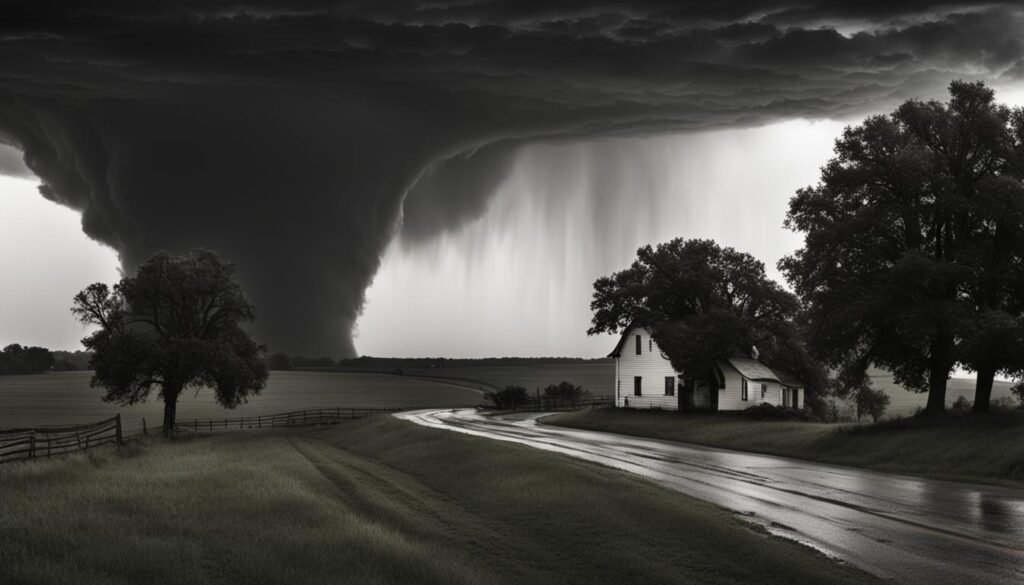
To understand the impact of tornadoes in Tennessee, it is important to analyze the historical frequency of these destructive weather phenomena. Over the years, Tennessee has experienced numerous tornado events, with varying degrees of severity and devastation.
Notable tornado events have left lasting marks on the state, causing significant damage to communities and landscapes. These events serve as reminders of the power and unpredictability of tornadoes in Tennessee.
Residents of Tennessee have also reported frequent sightings of tornadoes, highlighting the presence of these storms in the state. The frequency of these sightings underscores the need for preparedness and awareness among Tennessee residents.
Let’s take a closer look at some of the historical tornado events and the impact they have had on Tennessee:
| Date | Location | Severity |
|---|---|---|
| March 3, 2020 | Nashville | EF-3 |
| April 27, 2011 | Memphis | EF-5 |
| April 10, 1974 | Xenos | EF-4 |
These are just a few examples of the tornado events that have impacted Tennessee. The severity of these tornadoes reflects the destructive potential and the need for continued vigilance in tornado-prone areas.
Next, we will assess the tornado risk in Tennessee and explore strategies to stay safe during tornadoes.
Tornado Risk Assessment
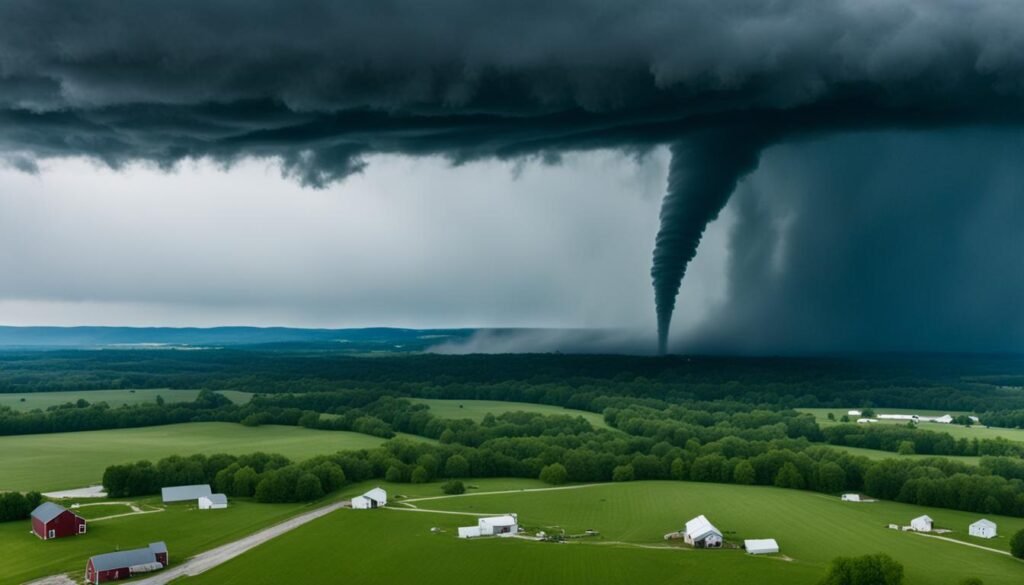
When it comes to tornadoes, understanding the level of risk is crucial for residents of Tennessee. By assessing multiple factors such as geographical location, climate patterns, and historical data, we can gain valuable insights into the tornado risk in the state.
Tennessee’s geographical location makes it susceptible to tornado activity, as it sits in the heart of “Tornado Alley,” a region known for frequent tornado occurrences. The state’s proximity to the Gulf of Mexico and the warm, moist air it brings creates the ideal conditions for tornado formation. This combination of geographic factors contributes to a higher tornado risk in Tennessee compared to other regions.
Climate patterns also play a significant role in tornado risk assessment. The state experiences distinct weather patterns, including severe thunderstorms with strong wind shear, which is a crucial ingredient for tornado development. Additionally, the transition between seasons and the collision of warm and cold air masses can increase the likelihood of tornadoes in Tennessee.
Examining historical data provides valuable insights into the frequency and intensity of tornadoes in the state. Over the years, Tennessee has experienced numerous significant tornado events that have caused significant damage. Understanding these historical events helps us gauge the potential risks residents face and prepare accordingly.
Tornado warnings also play a pivotal role in mitigating risks and ensuring the safety of Tennessee residents. The National Weather Service issues tornado warnings to alert individuals and communities about imminent threats. These warnings allow people to seek shelter and take necessary precautions to protect themselves and their loved ones.
By considering all these factors and understanding the role of tornado warnings, we can better assess the tornado risk in Tennessee. This knowledge empowers individuals, communities, and emergency response teams to effectively prepare, respond, and minimize the impact of tornadoes on the state.
| Factors | Contributing Factors to Tornado Risk in Tennessee |
|---|---|
| Geographical Location | Tennessee’s location in Tornado Alley increases the likelihood of tornado activity. |
| Climate Patterns | Distinct weather patterns, including severe thunderstorms and the collision of air masses, contribute to tornado formation. |
| Historical Data | Examining past tornado events helps assess the frequency and intensity of tornadoes in Tennessee. |
| Tornado Warnings | Tornado warnings issued by the National Weather Service allow individuals to take necessary precautions and seek shelter. |
Tornado Safety Tips
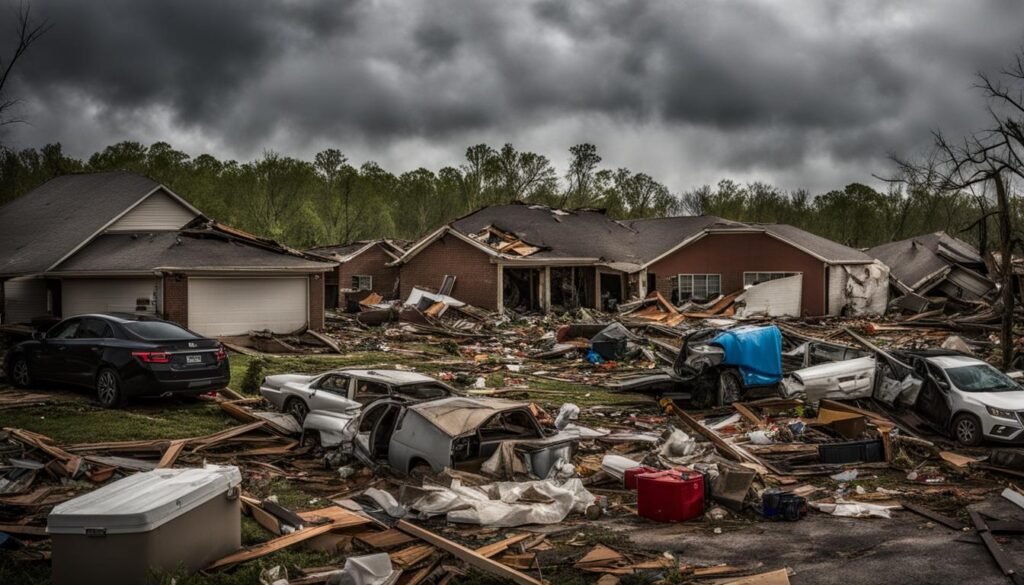
When it comes to tornadoes, being prepared and knowing how to stay safe is crucial for Tennessee residents. Here are some actionable safety tips to help you navigate tornado threats:
Create an Emergency Plan
Develop a detailed emergency plan for your household, including designated safe areas within your home and an established meeting point in case family members are separated. Ensure everyone understands the plan and knows what to do in the event of a tornado.
Stay Informed with Tornado Warnings
Regularly monitor local weather forecasts and tornado warnings issued by the National Weather Service (NWS) or local authorities. Sign up for emergency alerts on your mobile devices to receive timely notifications and updates.
Identify Safe Shelter Options
Identify sturdy structures that can serve as safe shelters during tornadoes, such as basements, storm cellars, or interior rooms on the lowest level of your home. Avoid windows and seek shelter away from exterior walls.
Prepare an Emergency Kit
Assemble a well-stocked emergency kit containing essential supplies, including non-perishable food, water, flashlights, batteries, a first aid kit, important documents, and any necessary medications. Keep the kit easily accessible in your designated safe area.
Practice Tornado Drills
Regularly practice tornado drills with your household to ensure everyone knows how to react quickly and safely. Consider conducting drills during different times of the day to simulate varied scenarios.
Take Shelter Immediately
If a tornado warning is issued or you observe signs of an approaching tornado, take shelter immediately. Move to your designated safe area, away from windows, and use pillows, mattresses, or cushions to protect yourself from flying debris.
Stay Informed During Tornadoes
If you find yourself in a tornado, listen to a weather radio or stay connected to local news sources for updates. Avoid using your phone unless it is for emergency communication.
Wait for the All Clear
After the tornado has passed, wait for the all-clear notification from authorities before leaving your safe area. Be cautious and mindful of potential hazards, such as downed power lines or damaged structures, when assessing the safety of your surroundings.
By following these tornado safety tips, you can better protect yourself and your loved ones in Tennessee during tornado events. Remember, preparedness and staying informed are key to minimizing the risks associated with tornadoes.
Tornado Preparedness Resources

Ensuring your safety and preparedness during tornado season is crucial. Here are some valuable resources that Tennessee residents can consult for further information on tornado risk and warnings:
Government Websites:
- National Weather Service – Tennessee: https://www.weather.gov/ohx/
- Tennessee Emergency Management Agency (TEMA): https://www.tnema.org/
Emergency Management Agencies:
- Tennessee Department of Safety and Homeland Security: https://www.tn.gov/safety.html
- Federal Emergency Management Agency (FEMA): https://www.fema.gov/
Community Organizations:
- Red Cross – Tennessee: https://www.redcross.org/local/tennessee.html
- Tennessee Emergency Communications Board: https://www.tn.gov/commerce/tennessee-emergency-communications-board.html
These resources provide valuable information on tornado risk assessment, monitoring, and response strategies. Stay informed and be prepared to protect yourself and your loved ones from the potential dangers of tornadoes.
Damage and Recovery
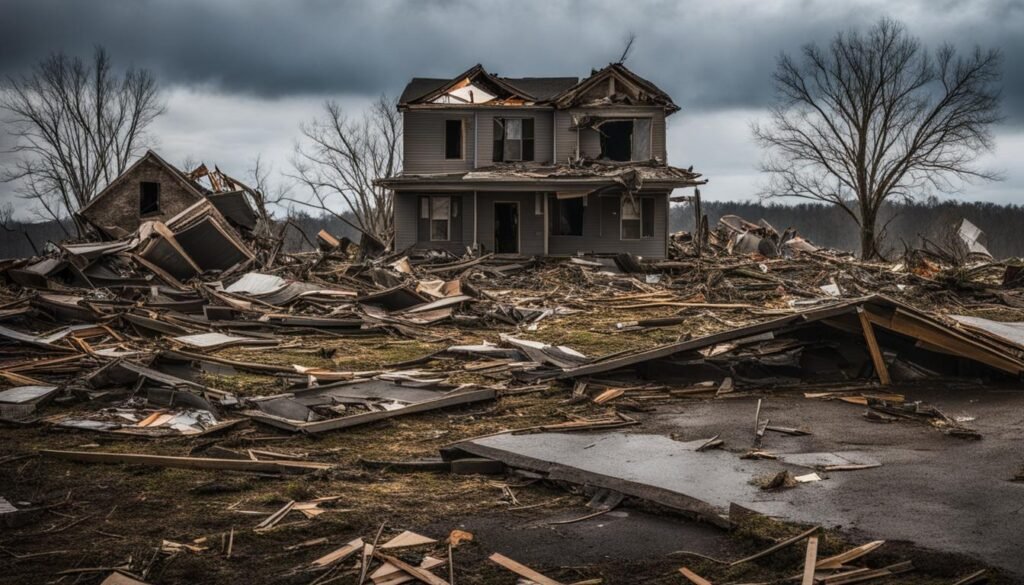
Tornadoes in Tennessee can cause significant damage to communities and have long-lasting effects on the affected areas. The destructive power of these natural disasters can result in the destruction or severe damage of buildings, infrastructure, and personal property. The recovery process after a tornado is a crucial step in rebuilding communities and ensuring the well-being of residents.
The types of damage caused by tornadoes in Tennessee can vary greatly, depending on the intensity of the storm and the specific area affected. Common forms of damage include:
- Structural damage to buildings, including homes, schools, and businesses.
- Downed power lines and utility poles, leading to power outages and disruptions in essential services.
- Debris scattered throughout the area, including fallen trees, damaged vehicles, and other objects displaced by the tornado’s force.
- Erosion and damage to natural landscapes, such as forests and farmland.
Recovery Efforts
After a tornado strikes, recovery efforts are initiated to provide immediate assistance to affected individuals and communities. These efforts are often led by local, state, and federal agencies, as well as non-profit organizations and volunteers. The goals of recovery include:
- Ensuring the safety and well-being of residents by providing emergency shelter, medical assistance, and essential supplies.
- Cleaning up debris and restoring essential services, such as electricity, water, and telecommunications.
- Assessing the extent of the damage and developing long-term recovery plans.
- Coordinating with community members, businesses, and organizations to facilitate the rebuilding process.
Recovery efforts can take months or even years, depending on the severity of the tornado and the resources available. During this time, communities come together to support one another and rebuild stronger and more resilient than before.
Role of Insurance
Insurance plays a vital role in mitigating the financial impact of tornado damage on individuals and businesses. Tennesseans are encouraged to have homeowners or renters insurance that covers damages caused by tornadoes. This insurance coverage can help individuals recover and rebuild their lives after a tornado strikes.
Homeowners and renters should review their insurance policies to ensure they have adequate coverage for tornado-related damages. It is important to understand the extent of coverage, deductibles, and any additional provisions related to tornadoes. Consulting with insurance agents can provide valuable information and assistance in navigating the claims process.
Insurance companies also play a role in supporting the recovery process. Adjusters assess the damages and work with policyholders to process claims and provide necessary financial assistance. The prompt and efficient handling of claims by insurance companies is essential in helping residents restore their homes and businesses.
By being adequately insured, individuals and businesses can significantly reduce the financial burden experienced after a tornado, facilitating a faster and more efficient recovery.
Conclusion
After exploring the occurrence and risk of tornadoes in Tennessee, it is clear that tornadoes do indeed exist in the state. Tornadoes are a natural phenomenon that can pose a significant threat to communities, and it is crucial for residents to be aware of the facts and take necessary precautions.
Throughout this article, we have highlighted important tornado facts specific to Tennessee, including information about tornado formation, frequency, and seasonality. Tennessee experiences a moderate level of tornado activity, with numerous tornadoes reported annually.
To mitigate the risks associated with tornadoes, it is essential for residents to stay informed and prepared. This includes understanding tornado warnings, creating an emergency plan, and knowing the safest sheltering options. By taking these proactive steps, individuals and communities can minimize the potential impact of tornadoes and ensure their safety.
Remember, tornadoes can occur quickly and with little warning, making preparedness efforts crucial. Keep an eye on local weather forecasts, stay tuned to official alerts and warnings, and share this knowledge with your loved ones. By staying informed and prepared, we can face the tornado risks in Tennessee with confidence and safeguard our communities.
FAQ
Are there tornadoes in Tennessee?
Yes, Tennessee is located in an area commonly known as Tornado Alley, which experiences a moderate level of tornado activity. The state has a history of tornadoes, and residents should be aware of the tornado risk and take necessary precautions.
What are some tornado facts about Tennessee?
Tornadoes in Tennessee can occur throughout the year, but the peak tornado season typically spans from March to May. The state experiences an average of around 30 tornadoes per year, with some years having higher activity. The tornadoes in Tennessee can vary in intensity, from weak EF0 tornadoes to strong EF5 tornadoes.
How often do tornadoes occur in Tennessee?
Tornado frequency in Tennessee varies from year to year, but the state generally experiences multiple tornado events annually. The frequency of tornado sightings reported by residents also varies, with some years having higher visibility of tornadoes than others.
How is tornado risk assessed in Tennessee?
Tornado risk in Tennessee is assessed based on factors such as historical tornado activity, geographical location, and climate patterns. The state’s emergency management agencies closely monitor weather conditions and issue tornado warnings to help residents stay informed and take appropriate action.
What are some tornado safety tips for Tennessee residents?
Tennessee residents should have a tornado emergency plan in place, identify a safe shelter area in their homes or workplaces, and stay informed about tornado warnings through weather alert systems. It is essential to listen to local authorities and follow their instructions during a tornado event.
Where can Tennessee residents find tornado preparedness resources?
Tennessee residents can find tornado preparedness resources from government websites, such as the Tennessee Emergency Management Agency (TEMA), as well as local emergency management agencies and community organizations. These resources may include guides, checklists, and educational materials.
What is the impact of tornadoes on Tennessee communities?
Tornadoes in Tennessee can cause significant damage to homes, infrastructure, and natural areas. The recovery efforts following a tornado event involve rebuilding communities, supporting affected residents, and assessing the damage. It is advisable for Tennessee residents to have appropriate insurance coverage to help mitigate the financial impact of tornado damage.
Why is it important to be aware of tornadoes in Tennessee?
Being aware of tornadoes in Tennessee is vital for the safety and well-being of residents. Understanding the risks, taking necessary precautions, and having a preparedness plan in place can help minimize the impact of tornadoes and increase the chances of survival during severe weather events.
